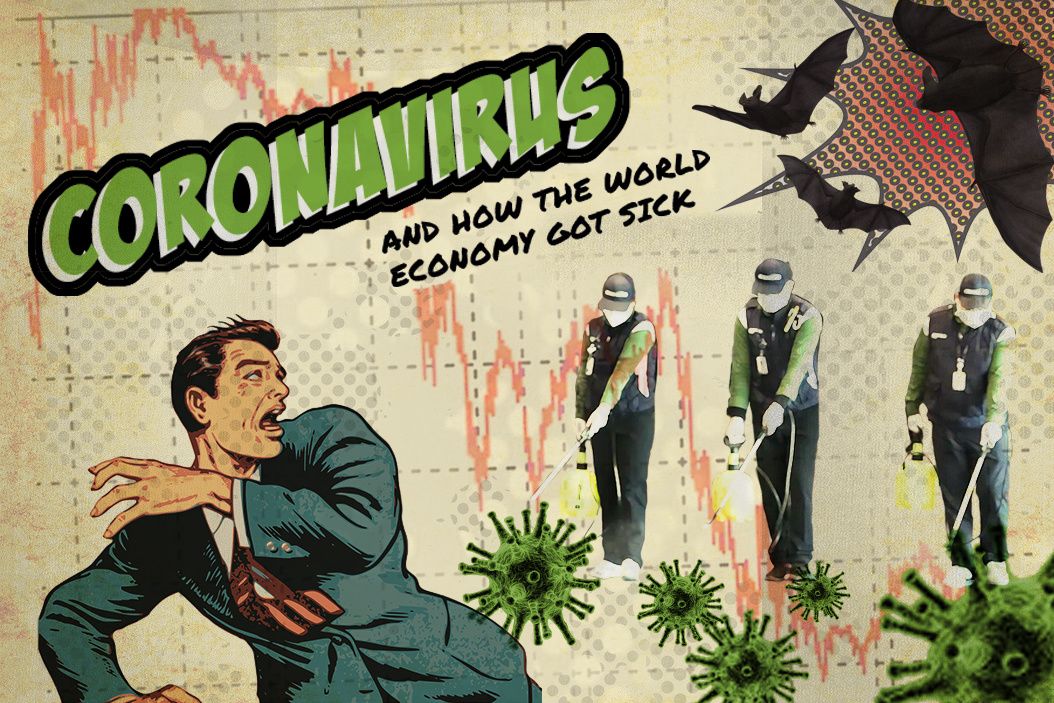February 03, 2020
Could a single bat in central China make the global economy catch a cold? Call it an undead variation of the butterfly effect, but as the Wuhan coronavirus (which may have originated in bats) continues to spread, companies and consumers around the world are bracing for chills.
Why? Well, for one thing, China accounts for about a fifth of global economic output and it's number one in global trade. That means that any time the Chinese economy shudders or stumbles, the shockwaves circle the globe. And China is most certainly shuddering.
To slow the disease's advance, officials extended the traditional Chinese New Year holiday, and locked down cities that are home to more than 50 million people. In Wuhan itself, a major manufacturing and export hub, factories are shuttered for at least another week, and about a dozen other industrial regions have followed suit.
While China's own people are clearly bearing the brunt of the epidemic, here are three reasons why the outbreak, and the response to it, are also affecting the global economy:
China is a leading market for the world's largest consumer goods companies. But the quarantine and lockdown restrictions have forced many of those businesses to go dark in China for now. Apple, for example, has closed all its stores in China, its second largest market. Starbucks, similarly dependent, has closed half its shops in the country. China's oil imports, the largest in the world, are also reportedly taking a hit as the virus crimps travel and industrial production there. Dozens of air carriers, meanwhile, have cut service to China.
China is the world's largest exporter, and with many of the factories that do that exporting now closed, global businesses that rely on parts and labor in China are scrambling to figure out alternatives. DHL, who know a thing or two about supply chains, have warned of "serious disruptions." This affects everything from your smartphone, to your vacuum cleaner to your (or your kids') video game consoles.
Markets get jittery. People who trade the stocks of all the companies affected by this are understandably jittery. US markets have taken a hit in recent days and China's main stock indices fell about 8 percent when they opened yesterday for the first time since the beginning of the Chinese New Year holiday.
The good news is, after it gets worse, it generally gets better – when China's stores, factories, and travel links reopen, there will likely be a mini boom as everyone gets back to shopping and working and exporting. The bad news is: we still don't know when that might be.
From Your Site Articles
More For You
Americans are moving less — and renting more. Cooling migration and rising vacancy rates, especially across the Sunbelt, have flattened rent growth and given renters new leverage. For many lower-income households, that relief is beginning to show up in discretionary spending. Explore what's changing in US housing by subscribing to Bank of America Institute.
Most Popular
Walmart sponsored posts
Walmart’s commitment to US-made products
What's Good Wednesdays
What’s Good Wednesdays™, February 4, 2026
World Central Kitchen staff hand out free soup in a neighbourhood that experiences electricity and heating outages following recent Russian attacks on Ukraine’s civilian infrastructure during subzero temperatures in Kyiv, Ukraine February 3, 2026.
REUTERS/Thomas Peter
1,170: The number of high-rise buildings in Kyiv that were left without heating following a barrage of Russian attacks last night on Ukraine’s capital and its energy facilities, per Kyiv Mayor Vitali Klitschko.
Protesters gather during a candlelight vigil, and interfaith prayer at Fort Lauderdale-Hollywood International Airport as airport workers and faith leaders rally calling on the federal government to extend Temporary Protected Status for Haiti on Jan. 28, 2026.
Diaz/Miami Herald via ZUMA Press Wire
Over the past five years, Haiti has endured extreme political turmoil, escalating violence, and one of the world’s worst humanitarian crises.
Microsoft unveiled a new set of commitments guiding its community‑first approach to AI infrastructure development. The strategy focuses on energy affordability, water efficiency, job creation, local investment, and AI‑driven skilling. As demand for digital infrastructure accelerates, the company is pushing a new model for responsible datacenter growth — one built on sustainability, economic mobility, and long‑term partnership with the communities that host it. The move signals how AI infrastructure is reshaping local economies and what people expect from the tech shaping their future. Read the full blog here.
© 2025 GZERO Media. All Rights Reserved | A Eurasia Group media company.
